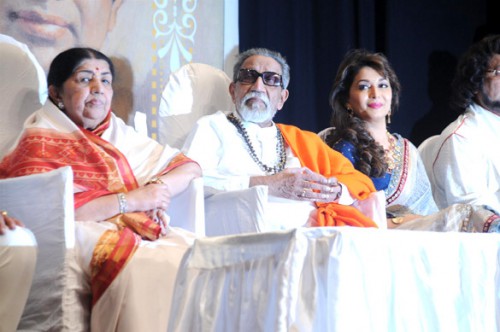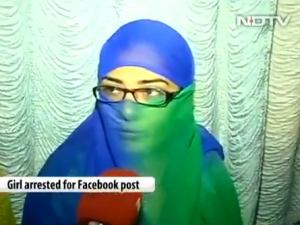An Indian God and Facebook Crimes
by Vijay Nair / December 3, 2012 / No comments
With the death of a politician India experiences the logic of the absurd.

Bal Thackeray (center) at the 70th Master Dinanath Mangeshkar Awards, 2012. Photo: BollywoodHungama.
Last Thursday, while attending the reading by Israel Centeno, the exiled writer from Venezuela currently being hosted by City of Asylum/Pittsburgh, I was struck by a particular line from the translated text that he shared: “The meaning has meaning. Only the absurd has logic.” The line stayed with me all through the weekend and then as I read about what happened in India in the last four or five days with increasing disbelief, it started to make sense. Back home, an absurd drama played out like never before.
Bal Thackeray died of age-related symptoms in Mumbai at the age of 86. For those unfamiliar with Indian politics, googling his name should tell you that he was a Hindu fundamentalist right-wing leader from Mumbai who had made his place in the sun by forming a party of hoodlums that, at different points of time, since the state of Maharashtra was formed with Mumbai as its capital, wanted different groups out of the state in general—and from India’s largest metropolis in particular. It started with the South Indians in the 60s and the 70s and then their collective hatred turned towards Muslims, and finally, in the past two decades, North Indians were targeted. The logic backing the street violence encouraged by Thackeray and his men was always the same. The ‘outsiders’ were snatching away the livelihood of the locals, the ‘Marathi Manoos.’ The riots in Mumbai in the early 90s following the blasts were fanned by Thackeray and his political outfit, Shiv Sena. Thackeray openly claimed credit for exhorting his party men to go and kill minorities.
During his life Thackeray also made public statements about how he worshiped Adolf Hitler. But no one protested. Everyone living in Mumbai—from the politicians to the richest of industrialists to the most popular Bollywood stars—was afraid of him, his family, and his political party. As a citizen of the country that prides itself on being the world’s most populous democracy, Thackeray never believed in engaging his opponents, political or otherwise, in a debate. His men were more than happy to pay them a visit. In the early years of his political rise, many of his political opponents were bumped off while the state machinery looked on helplessly.
The opportunism displayed by political parties of all hues ensured that Thackeray never went to jail for his inflammatory speeches against minorities, nor the illegal acts committed by his followers. Instead, when he died, politicians, industrialists, and film stars all fell over each other to pay him glowing tributes. Thackeray’s body was draped in the national tri-color and accorded a state funeral. Two million Indians joined his funeral procession. There were rumours that the city would be shut down the next day as a mark of grief, although Thackeray’s party was quick to deny it.
The residents of Mumbai had reasons to be tense because, in the past, the Shiv Sainiks have given ample evidence that their behaviour cannot be predicted. Most people decided to stay indoors rather than risk the wrath of a mob.
Shaheen Dhada is a 21 year-old girl living in one of the many suburbs of Mumbai. On her Facebook account she posted an innocuous statement that men like Thackeray die every day and the city should not shut down because of his death. A friend of hers on Facebook, Renu Srinivasan, liked the comment. The same night the cops came knocking and arrested the two girls. They were released on bail after they wrote apologies and furnished personal bonds of fifteen thousand rupees (about $269) each. Shaheen has an uncle who is a doctor and runs a small hospital. A group of goons attacked his hospital and caused extensive damage to the property. Under increasing media and public pressure, nine or 10 of them were arrested forty eight hours later.
The Indian constitution guarantees the freedom of speech and expression. However the IT act formulated by the present government has a draconian clause that states:
“ 66A. Punishment for sending offensive messages through communication service, etc.
Any person who sends, by means of a computer resource or a communication device,—
(a) any information that is grossly offensive or has menacing character; or (b) any information which he knows to be false, but for the purpose of causing annoyance, inconvenience, danger, obstruction, insult, injury, criminal intimidation, enmity, hatred or ill will, persistently by making use of such computer resource or a communication device, (c) any electronic mail or electronic mail message for the purpose of causing annoyance or inconvenience or to deceive or to mislead the addressee or recipient about the origin of such messages, shall be punishable with imprisonment for a term which may extend to three years and with fine.”
This was one of the acts to be invoked by the Maharashtra police to arrest the two girls. The architect of this particular clause is the current Minister for Communications and Information Technology, Kapil Sibal. Sibal is a poet and was invited by the Jaipur Literary Festival for one of the inaugural sessions in the same year that Salman Rushdie was asked to stay away. After the two girls were arrested, Sibal issued a public statement stating that it was wrong to arrest the two girls and that the IT act was misused. But as I am writing this piece the charges against the two girls have yet to be withdrawn.
The other act that was used to arrest the two girls had to do with hurting religious sensibilities. Members of Shiv Sena were quick to rush to the defense of the police officials who arrested the two girls. They now claim Bal Thackeray is their god and they can construe anything said against Thackeray to be against their god and religion.
It’s not as if Thackeray’s credentials as a leader have not been attacked by writers, artists and intellectuals in India, after his death. There have been as many obituaries denouncing him as there have been ones eulogizing him. Manu Joseph, one of the best literary voices of contemporary times and a columnist for the New York Times, addressed Thackeray as the ‘Last Don’ of Mumbai in his latest letter from India to the newspaper. He also concluded his piece with a compelling mix of humor and irony: “The way of the nation is that he will soon become a statue with a pointed index finger on whom pigeons will mete out justice.”
Joseph’s column, like that of many of the other writers who have said unflattering things about Thackeray, will be posted online and go viral. But I don’t think any of them are in any danger of getting arrested. Bullies know instinctively who they can take on and who they can’t.
In the meantime the two girls have expressed regret about what they posted on Facebook and have gone out of the social media platform. Tellingly, they are behind a veil in all their recent media photographs. The latest defense being floated in the democracy I live in is that the arrests were made in the interest of the two girls’ safety. Because they were arrested, a mob didn’t come looking for them.
“The meaning has meaning. Only the absurd has logic.”





